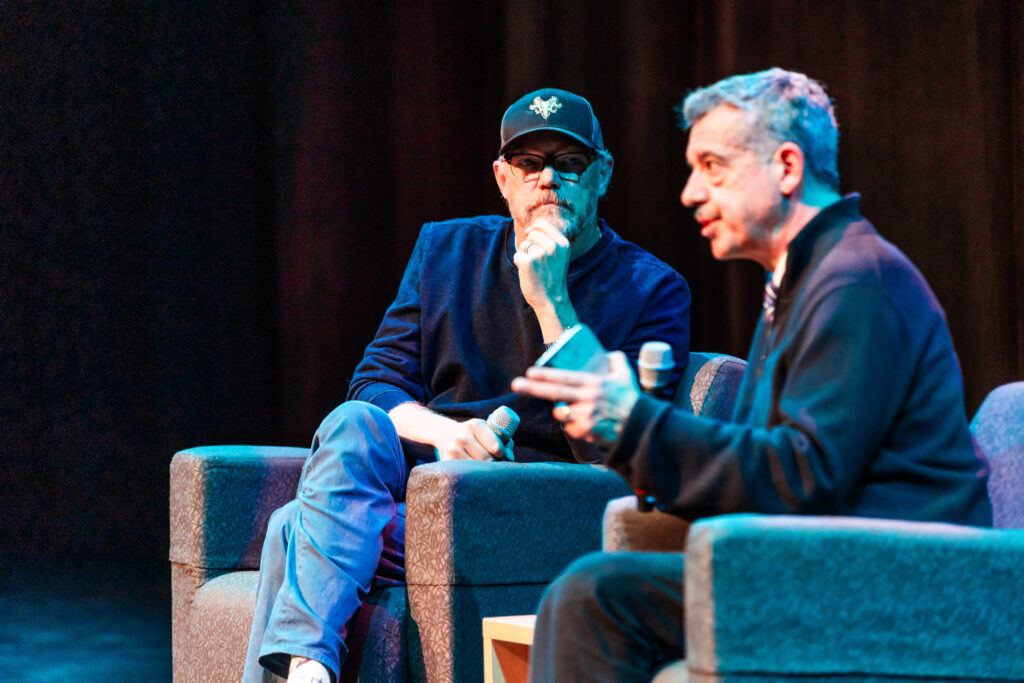“It’s a terrible analogy. Do you want to hear it?”
The packed crowd at the Bing Theatre roared their approval. They were there to see Hollywood star and noted multihyphenate Matthew Lillard, who had stopped by for a Spotlight conversation with an old friend, USC Professor in Dramatic Writing Oliver Mayer. In characteristic Lillard fashion, he brought the energy.
Lillard’s “terrible analogy” turned out to be a beautiful and elegant thesis for the evening. He invited the audience to imagine artists as a pack of antelope running across the Serengeti. An artist’s goal, Lillard said, is not to book a specific film or commercial, but rather to look back at the end of one’s life and see that they are still making art—still running with the other antelope.
“Our goal as artists is to spend our entire lives doing this, right?” Lillard said. “And what happens is, you go off on your own and you don’t make it back. You need the fellowship of other artists around you.”
Although perhaps best known for iconic Hollywood roles like Stu Macher in the Scream franchise and Shaggy Rogers in Scooby Doo, Lillard is also a director, producer, teacher and successful entrepreneur. His directorial debut, Fat Kid Rules the World, won the 2012 Audience Award at SXSW, and his companies—many inspired by the classic tabletop roleplaying game Dungeons & Dragons—have turned into successful business ventures. Most recently he has appeared as William Afton in the smash hit horror film based on the popular video game, Five Nights at Freddy’s.

Fail your heads off
Lillard, who discovered a passion for teaching midway through his career, praised university programs like the USC School of Dramatic Arts, which, in addition to expert instruction, provide fellowship with other artists and a safe space for young artists to experiment and find their voice.
“I think school is the greatest gift ever,” Lillard said. “You all should be enjoying this moment in your lives as artists. You should be trying and failing at stuff every single day.
You should be failing your heads off.”
Lillard acknowledged that the hardest part of studying art at an educational institution is taking the first steps into the world on your own after you graduate. He encouraged students to go out fearlessly, prepared to make their own work rather than waiting for opportunities to come to them (“That’s the worst way to spend a life,” Lillard warned) and not being too deeply attached to early results. He compared the process of making one’s first post-collegiate work of art to having a child.
“You’re never ready to have a kid. A kid comes when it comes,” Lillard explained. “And you’re going to accept that kid and love that kid forever, no matter where you’re at financially. As an artist, it’s never going to be a perfect time, and there’s never going to be a clear answer. You just have to jump in and create.”
Lillard described the process behind his directorial film debut, Fat Kid Rules the World. He described a production truck arriving four hours late, throwing his day into total disarray, and furiously rearranging his entire schedule on the fly to make up for lost time.
“At the end of the day, the producer came to me—Rick Rosenthal, who became an incredible mentor for me—and he said: we’re going to make the movie,” Lillard recalled. When Lillard objected that Rosenthal hadn’t seen any of the film yet, the producer replied: “You just did something that was crazy, and you did it without losing your cool.” “So we made the movie, and we won the Audience Award at SXSW,” Lillard said to applause from the audience.

Outwork everyone
Lillard was energetic and vulnerable answering questions, both personal and professional, from the USC students in the audience. He covered topics ranging from the makings of a good director to keeping art as a source of joy even after it becomes a profession. Lillard exchanged witticisms with the students and talked frankly about his own experiences, triumphs and insecurities.
“I’m trying to think of how to make this a teaching moment,” he said.
“You ask me for tangible things to do as an artist?” Lillard responded to one student. “This is what you do: Write the things you want down. How can you get somewhere if you don’t know where you want to go? You have to write that down and then, at the end of the year, look at what you did and didn’t do.”
Lillard emphasized the value of hard work, saying that he keeps a mantra—“Outwork Everyone”—on a slip of paper in his wallet.
“There’s a dignity to work. The idea of being able to go out and work, even though you don’t get the role, fills you with strength,” he said. “You can say ‘I’m still on my path. I’m not the 40 year-old dude who hasn’t worked in 20 years. I just auditioned. It didn’t go my way, but I did my work.’”
Lillard left the students by imploring them to remember what got them started on their current path in the first place. “This is why we do it. Nobody got into this to have 10 million followers on Instagram,” Lillard said. “We got into it to make art. And so that’s the thing we have to seek, no matter what you’re building.”
Watch Matthew Lillard give advice about energy and presence to USC actors here:
